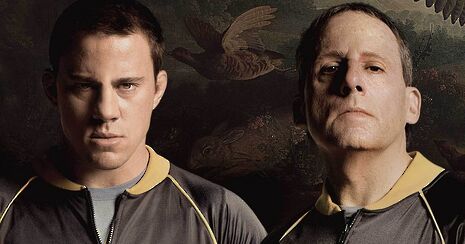Film: Foxcatcher
Kit Fowler finds Foxcatcher to be a disturbing horror film of the American Dream

Ominous strains of a cello? Check. Piano melody bearing more than a passing resemblance to Schindler’s List? Check.
Brace yourself for the deeply chilling psychological drama that is Foxcatcher. Based on a true story, the film follows the brothers Mark and Dave Schultz (Channing Tatum and Mark Ruffalo), Olympic gold-winning wrestlers, as they are recruited by John du Pont (Steve Carell).
A wealthy recluse who is bent on creating the greatest US wrestling team the world has ever seen, du Pont believes wrestling for one’s country to be dulce et decorum est.
While Dave is able to enjoy a family life outside of wrestling, Mark spends his nights alone with instant noodles after awkwardly addressing schools, and longs for enduring success, seemingly possible with du Pont’s help.
Most of the film takes place on du Pont’s estate, which creates a claustrophobic atmosphere reminiscent of The Shining’s Overlook Hotel.
I must admit I thought the shadows of Anchorman, The Office and 21 Jump Street would loom too close for me to be able to take Carell and Tatum seriously – both, however, have created characters that far exceed their comic roles and contribute to a slow-burning but quietly horrifying film.
In du Pont, Carrell has created a disturbingly believable creature. The subtle oddities, like strange vocal inflection or a top lip that curls a little too far, keep the audience on edge.
But Carell’s real achievement is to slowly change the audience’s perception of du Pont from a lonely, unsettling chemical fortune heir with an unusual passion to a paranoid psychopath with zero empathy.
By the film’s denouement, Carell is truly a revolting presence on screen whom the audience loathes. The effect is compounded by du Pont’s relationship with his mother (even in talented company, Vanessa Redgrave shines), which alternates between a petulant middle aged man throwing his multi-million dollar toys out of the pram to a distinctly Freudian complex. Du Pont literally adopts a submissive position in the ring when his mother is watching.
We are constantly reminded of the inability of men to communicate emotionally with one another; Mark seems not only unwilling but physically unable to confide in Dave, despite the iron bond between the brothers.
Both seem deeply frustrated by this lack of articulation, and instead attempt to use the ring as a mouthpiece to express their feelings and fears.
Yet, far from portraying wrestling as a physical art form or an ancient masculine rite of passage, the film’s imagery is constant in its portrayal of Dave as an animal, an ‘ape’, as du Pont eventually comes to describe him.
Tatum’s nostrils flare as he grunts, and the wrestling movements reduce the human form to the shuffles of a gorilla, hunched over and menacing; tellingly, du Pont summons him as one would a dog.
There is a sense of regression in the ring, and it is to the cinematographer’s credit that wrestling seems not an olympic sport of speed and skill but, as Redgrave puts it, a ‘low’ sport, which strips competitors of language and humanity.
Homoeroticism is perhaps an inevitable theme here; hordes of men greased up and wearing lycra, with very little screen time given to women, means that one particular scene with Tatum in boxers definitely suggests a relationship beyond the platonic with du Pont (this has been fiercely denied by the real Mark).
Every drip of sweat and squeak of gym shoe on floorboard is magnified, and prolonged shots of wrestling ‘holds’ build an intensity that is almost uncomfortably sexual at points.
Yet to simply categorise the male relationships as a combination of infantile in their emotions and closeted in their sexuality would be to do the film a disservice: it is the lack of any sort of father figure for all three leads that points to the real heart of the film.
The father of the brothers isn’t around, and the search for a male role model creates psychological tensions and desires.
Mark is clearly desperate to give his filial affection to anyone who shows him the least bit of kindness, while du Pont sees his role of coach as inclusive of a broad range of capacities, namely father, brother, leader and teammate.
The tragedy of the finale stems from a complex series of rejections which are simultaneously professional, sexual and familial, with undertones of Oedipus and Falstaff.
Foxcatcher leaves the viewer profoundly shaken and reminds us that no horror film can produce monsters as unsettling as those produced in pursuit of the American Dream.
 News / Fitz students face ‘massive invasion of privacy’ over messy rooms23 April 2024
News / Fitz students face ‘massive invasion of privacy’ over messy rooms23 April 2024 News / Climate activists smash windows of Cambridge Energy Institute22 April 2024
News / Climate activists smash windows of Cambridge Energy Institute22 April 2024 News / Copycat don caught again19 April 2024
News / Copycat don caught again19 April 2024 Comment / Gown vs town? Local investment plans must remember Cambridge is not just a university24 April 2024
Comment / Gown vs town? Local investment plans must remember Cambridge is not just a university24 April 2024 News / Emmanuel College cuts ties with ‘race-realist’ fellow19 April 2024
News / Emmanuel College cuts ties with ‘race-realist’ fellow19 April 2024




